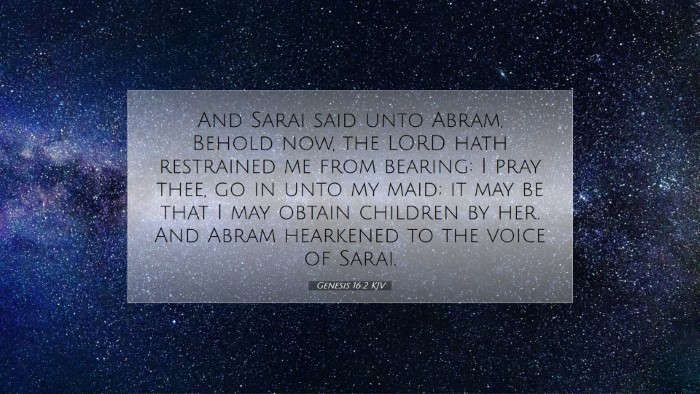Commentary on Genesis 16:2
Verse Reference: Genesis 16:2 - "And Sarai said unto Abram, Behold now, the Lord hath restrained me from bearing: I pray thee, go in unto my maid; it may be that I may obtain children by her. And Abram hearkened to the voice of Sarai."
Introduction
This pivotal moment in the narrative of Genesis marks a significant turning point in the lives of Abram (later Abraham) and Sarai (later Sarah). Faced with the pressing demand of unfulfilled promises from God concerning offspring, Sarai takes matters into her own hands, leading to consequences that resonate throughout biblical history. The following commentary draws from respected public domain sources to provide a holistic understanding of this verse.
Contextual Background
At this juncture in Genesis, Abram is about 86 years old, and Sarai is ten years younger. They have journeyed far from their homeland, responding to God’s call, yet they find themselves in a state of desperation regarding God's promise of descendants. The cultural context of the ancient Near East, where surrogacy was a practice for childbearing, plays a significant role in Sarai's proposal.
Key Themes and Insights
-
Human Attempt to Fulfill Divine Promise:
As Matthew Henry highlights, Sarai's suggestion to Abram reflects a common human tendency to take control when faced with divine delays. The act of seeking an alternative means to fulfill a promise can lead to complex and unintended consequences. This incident serves as a reminder of our propensity to rely on human wisdom rather than waiting on divine timing.
-
The Role of Faith and Doubt:
Albert Barnes points out that Sarai’s lack of faith in God’s ability to fulfill His promises prompted her to take matters into her own hands. Here, we see the juxtaposition of faith and doubt; Sarai’s actions stem from a position of doubt about God's promises. This duality challenges believers to examine their responses when faced with waiting periods in their faith journeys.
-
The Complexity of Relationships:
Adam Clarke emphasizes the relational dynamics at play in this scenario. Sarai's decision places both herself and Hagar in a position of vulnerability. It exemplifies how personal choices can impact relationships and culminate in conflict, a theme that recurs throughout the biblical narrative.
-
Theological Implications of Hagar's Role:
Hagar, the maidservant, becomes a central figure in this passage. While she is initially viewed merely as a means to an end, her experience raises significant theological questions about the value and dignity of the marginalized in the biblical text. Barnes notes that Hagar's situation serves as a precursor to God’s later interactions with the oppressed, affirming that God sees and hears the cries of those in distress.
Lessons for Today’s Believers
This passage invites contemporary readers to reflect on several important themes:
-
Trusting God's Timing:
The overarching lesson from Genesis 16:2 is a call to trust in God’s timing. The impatience displayed by Sarai often mirrors the struggles faced by believers today. The call is not just to act but to be fruitful in faith while waiting for God's promises to come to fruition.
-
The Consequences of Unwise Decisions:
Every decision, particularly those made in haste or desperation, carries consequences. A reflection on this passage may lead leaders to ponder the long-term effects of their actions on their ministries and communities.
-
Understanding God’s Sovereignty:
This narrative underscores God’s sovereignty amidst human failings. Despite the couple's missteps, God's plans unfold according to His divine purpose, reminding believers that His sovereignty transcends human error.
Conclusion
Genesis 16:2 serves as a poignant reminder of the struggles of faith, the importance of patience, and the complexities of human relationships in the pursuit of divine promises. It calls those in pastoral, academic, and spiritual roles to address the nuances of faith as it intersects with the reality of human experience.


